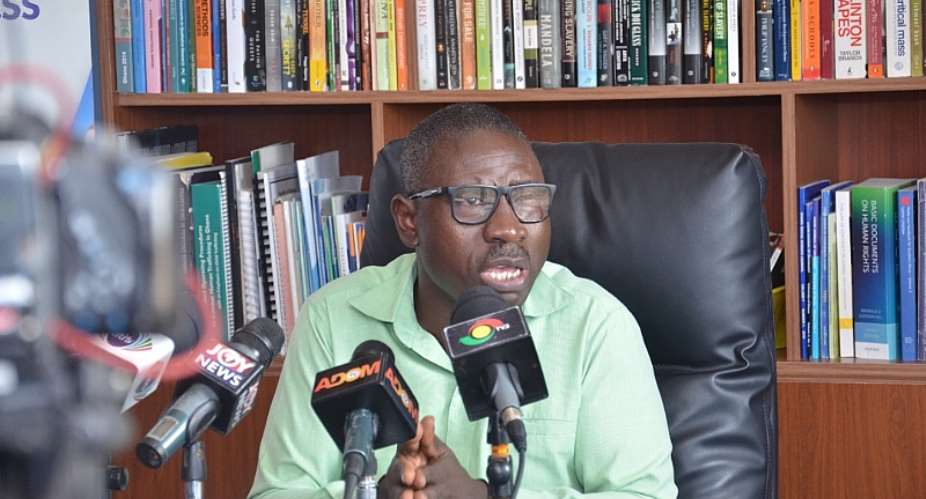The Capitation Grant was introduced in the 2003/2004 academic year, to offer Free, Compulsory, Universal Basic Education (FCUBE) for all school going children of Ghana, in fulfilment of Article 25(1)(a) of Ghana’s 1992 Constitution, which states that, “basic education shall be free, compulsory, and available to all”.
The capitation grant scheme was therefore introduced to replace all fees paid by parents in public basic schools, in order to expand access, and to support school performance improvement efforts, by the schools. In this regard, government paid all the fees which were supposed to have been paid by the children in public basic schools.
While commending government for increasing the capitation grant from GHC4.5 to GHC10 per child per term, we believe that the delays in the release of the funds diminishes the intended impact of the grant.
The fees paid by the government were to cover general stationery and management, office machinery, first aid, building maintenance, sporting fees, cultural fees, sanitation fees, furniture and tools, textbook user fees, practical fees, as well as machinery for technical schools and institutions.
Currently government is reported to be owing basic schools in excess of GHC315million, representing four terms in arrears.
In 2015, the Institute of Statistical, Social and Economic Research (ISSER), conducted a research that showed that public basic schools were charging fees, far in excess of what was being charged before the introduction of the capitation grant. According to the ISSER report, some of the fees charged were examination fees, extra classes fees, PTA dues, collection (offertory), maintenance fees, sports levies, cultural levis, excursions, funeral and capital development.
In a just concluded research that Challenging Heights has done, we have discovered a worsened and deteriorating fee-paying situation in most public basic schools in Ghana.
Challenging Heights’ report interviewed heads of basic schools in five out of the sixteen regions, and in 25 districts within those selected regions. The results showed that children in public basic schools are being forced to pay levies to cover desks, teachers’ motivation, admission fees, printing fees, PTA dues, development levy, ICT fees (even when there are no electricity or computers in the schools), sports fees, Dettol, toilet rolls, soap/detergents, brooms, bowls, cups, practical fees, cutlasses, hoes, dusters, plastic chairs, mats, electricity, water, security, canteen charges, special mock and midterm examinations.
Challenging Heights’ research revealed that some public basic school children could be paying as high as over GHC2,000 per academic year. This is far in excess of some of the fees charged at some private basic schools in Ghana.
Specifically, the results revealed that at the pre-school level, some parents are paying minimum GHS459.50, and a maximum amount of GHC1,039.49 per academic year. At the lower primary school level, the results show that parents spend minimum GHS302.5, and a maximum of GHC1,319.00 per academic year. At the upper primary school level, the results indicate that parents could be paying a minimum amount of GHS295.8 per academic year, and a maximum amount of GHS1,224.5 per academic year of the education of their children. The JHS level analysis revealed that parents could be paying a minimum of GHS339.5 and a maximum of GHS2,016.00 per academic year.
It is understandable that when the heads of these basic schools are in financial distress, the only immediate remedy is to fall on the parents of the children, to bail them out of the situation, hence the charging of these hidden and unapproved fees and levies.
These completely defeats the original intentions for the introduction of the capitation grant, and we therefore call on government to immediately clear all arrears owed basic schools, to enable the schools operate efficiently.
We are also by this asking the government of Ghana to suspend the introduction of the B-STEM education. We support B-STEM education in principle. However the Free, Compulsory, Universal Basic Education (FCUBE) is already suffering financially. There is therefore no guarantee that the far more financially demanding B-STEM education can be sustained under our present circumstance.





 Minority will expose the beneficial owners of SML, recover funds paid to company...
Minority will expose the beneficial owners of SML, recover funds paid to company...
 Prof. Opoku-Agyemang has ‘decapitated’ the NPP’s strategies; don’t take them ser...
Prof. Opoku-Agyemang has ‘decapitated’ the NPP’s strategies; don’t take them ser...
 Abubakar Tahiru: Ghanaian environmental activist sets world record by hugging 1,...
Abubakar Tahiru: Ghanaian environmental activist sets world record by hugging 1,...
 Prof. Naana Opoku-Agyemang will serve you with dignity, courage, and integrity a...
Prof. Naana Opoku-Agyemang will serve you with dignity, courage, and integrity a...
 Rectify salary anomalies to reduce tension and possible strike action in public ...
Rectify salary anomalies to reduce tension and possible strike action in public ...
 Stop all projects and fix ‘dumsor’ — Professor Charles Marfo to Akufo-Addo
Stop all projects and fix ‘dumsor’ — Professor Charles Marfo to Akufo-Addo
 Blue and white painted schools will attract dirt shortly – Kofi Asare
Blue and white painted schools will attract dirt shortly – Kofi Asare
 I endorse cost-sharing for free SHS, we should prioritise to know who can pay - ...
I endorse cost-sharing for free SHS, we should prioritise to know who can pay - ...
 See the four arsonists who petrol-bombed Labone-based CMG
See the four arsonists who petrol-bombed Labone-based CMG
 Mahama coming back because Akufo-Addo has failed, he hasn't performed more than ...
Mahama coming back because Akufo-Addo has failed, he hasn't performed more than ...
